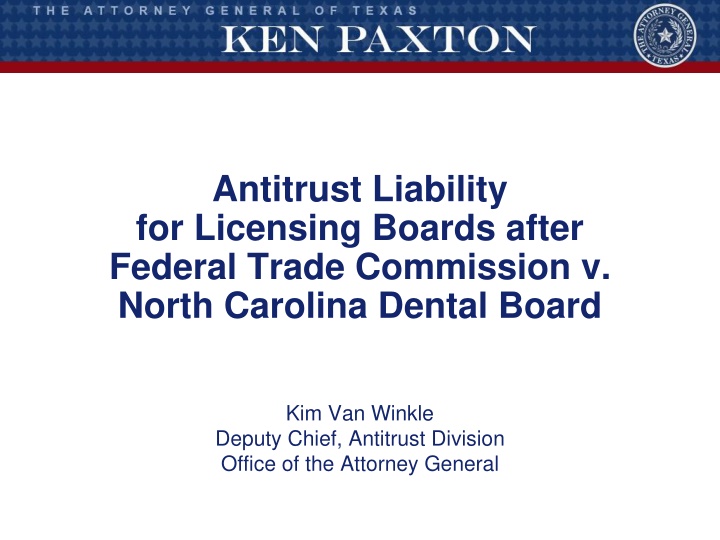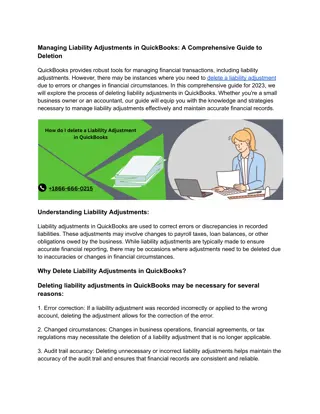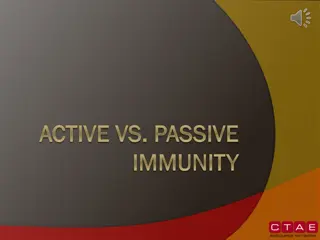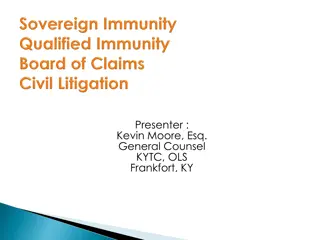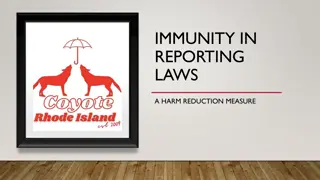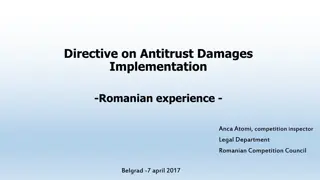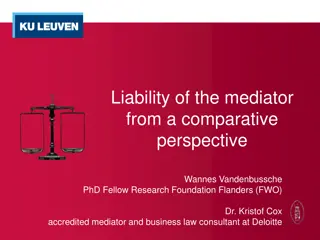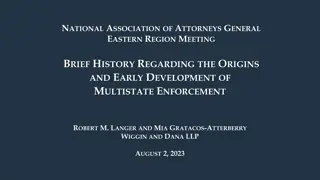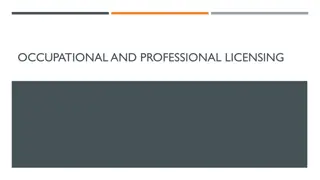Antitrust Liability for Licensing Boards - State Action Immunity
This content discusses antitrust liability for licensing boards post the Federal Trade Commission v. North Carolina Dental Board case, exploring the State Action Immunity Doctrine and the need for active supervision to ensure compliance with antitrust laws, as outlined in the FTC Staff Guidance.
Download Presentation

Please find below an Image/Link to download the presentation.
The content on the website is provided AS IS for your information and personal use only. It may not be sold, licensed, or shared on other websites without obtaining consent from the author.If you encounter any issues during the download, it is possible that the publisher has removed the file from their server.
You are allowed to download the files provided on this website for personal or commercial use, subject to the condition that they are used lawfully. All files are the property of their respective owners.
The content on the website is provided AS IS for your information and personal use only. It may not be sold, licensed, or shared on other websites without obtaining consent from the author.
E N D
Presentation Transcript
Antitrust Liability for Licensing Boards after Federal Trade Commission v. North Carolina Dental Board Kim Van Winkle Deputy Chief, Antitrust Division Office of the Attorney General
State Action Immunity Doctrine Parker v. Brown, 317 U.S. 341 (1943). Recognizing states rights to regulate their economies, Court conferred antitrust immunity on anticompetitive conduct by states acting in their sovereign capacities. Immunity is disfavored, and may not be invoked unless the actions in question are an exercise of the State s sovereign power. State legislation and decisions of a state supreme court acting legislatively rather than judicially ipso facto are exempt from the operation of the antitrust laws. But state agencies are not simply by their governmental character sovereign actors. Court is concerned about political accountability and structural risk of self-dealing.
NCBDE The (BAD) Facts North Carolina State Board of Dental Examiners v. FTC, 135 S. Ct. 1101 (2015). 6 of 8 Board members were dentists, elected by other dentists Board got complaints from dentists about low-price tooth whitening Documents/evidence of intent Board didn t engage in rulemaking, rather: Sent C&D letters to whiteners asserting that whitening was practice of dentistry and potentially criminal Convinced other Board to warn cosmetologists Sent letters to mall operators It worked! Board acted to expel the dentists competitors from the market.
NCBDE Active Supervision Required Limits on state action immunity are most essential when the State delegates regulatory power to active market participants, especially those authorized by the State to regulate their own profession. Not about whether the conduct is efficient, well-functioning, or wise. It s whether the conduct should be deemed state action because it is the result of procedures that suffice to make it the State s own. When a State empowers a group of active market participants to decide who can participate in its market, and on what terms, the need for [state] supervision is manifest.
FTC Staff Guidance FTC issued (nonbinding) Staff Guidance on Active Supervision of State Regulatory Boards Controlled by Market Participants October 2015 States can avoid all conflict with the federal antitrust laws by making all boards advisory or composed of only non-market participants Attempts to answer when active supervision is necessary and how to assess whether test is satisfied Clarifies that lack of active supervision doesn t necessarily equal an antitrust violation, just no immunity Lays out factors FTC staff would consider in evaluating active supervision
Which Boards are Implicated? Active supervision is required where the State delegates control over a market to a non-sovereign actor on which a controlling number of decision makers are active market participants in the occupation the board regulates. Active market participant means a board member who is licensed in the profession regulated by the board. FTC Staff Guidance: includes those who provide any service subject to the board s regulatory authority FTC Staff Guidance: regardless of specialty, method of selection to board, or inactive/retired status Controlling number may mean less than a numerical majority. Supreme Court also uses the term dominated. FTC includes de facto control; fact-bound, case-by-case inquiry, including veto power, tradition, or practice
Requirements for State Action Immunity Clear Articulation. The State has articulated a clear policy to allow the anticompetitive conduct; the challenged restraint is affirmatively expressed as state policy. the displacement of competition [is] the inherent, logical, or ordinary result of the exercise of authority delegated by the state legislature, such that the State must have foreseen and implicitly endorsed the anticompetitive effects as consistent with state policy goals. and Active Supervision. The conduct must be actively supervised by the State to provide a realistic assurance that a private party s anticompetitive conduct promotes state policy, rather than merely the party s individual interests.
Active Supervision State officials must have and exercise power to review particular anticompetitive acts of private parties and disapprove those that fail to accord with state policy. The constant requirements of active supervision: The supervisor (not an active market participant) must review the substance of the anticompetitive decision, not merely the procedures used to produce it. The supervisor must have the power to veto or modify particular decisions to ensure they accord with state policy. The mere potential for state supervision is not an adequate substitute for a decision by the State. FTC Staff Guidance: supervision must precede implementation; supervisor should have adequate information, evaluate substantive merits and issue written decision approving, modifying or disapproving the recommended action.
Sherman Antitrust Act, Section 1 Conspiracies (agreements) in restraint of trade prohibited Requires proof of agreement among horizontal competitors (here, the active market participant board members) Unreasonable restraint rule of reason analysis (balancing pro-competitive and anti-competitive effects) per se violations: price fixing, bid rigging, customer allocation, territory allocation, group boycott Per se violations deemed inherently unreasonable; no economic benefit derived from these types of agreements (based on courts experience and economic analysis)
Certain Board Actions Not Likely to Raise Antitrust Concerns Reasonable restraints on competition are not illegal, even where a competitor is injured economically. For example: Prohibitions on regulated person engaging in fraudulent business practices Prohibitions on regulated person engaging in untruthful or deceptive advertising Non-Discretionary (ministerial) actions that implement an anticompetitive statutory regime Denial of license for failure to submit required fee Denial of license for failure to submit proof of education Actions against a single licensee; de minimis market effect so unlikely to unreasonably harm competition. Actions compelled by clear state law or policy.
